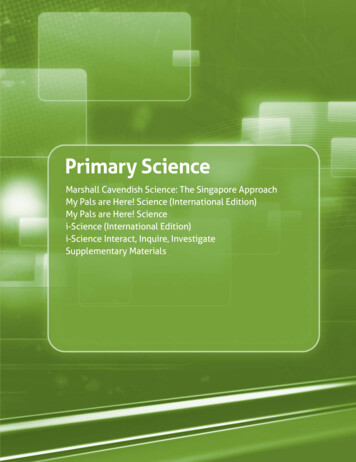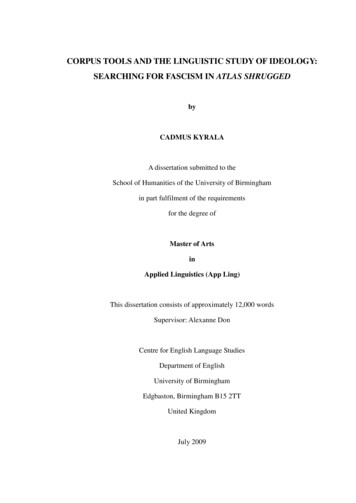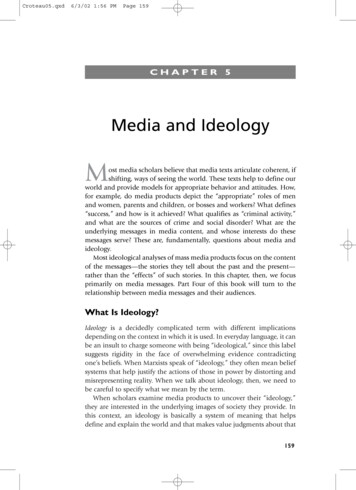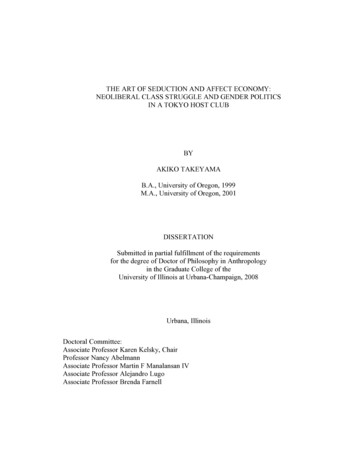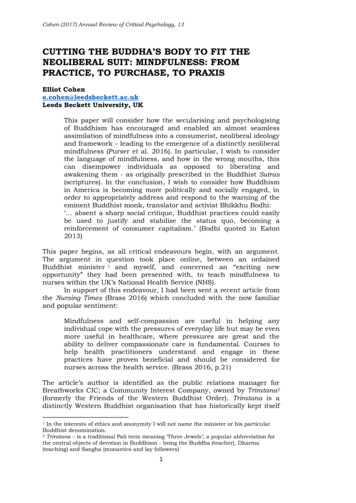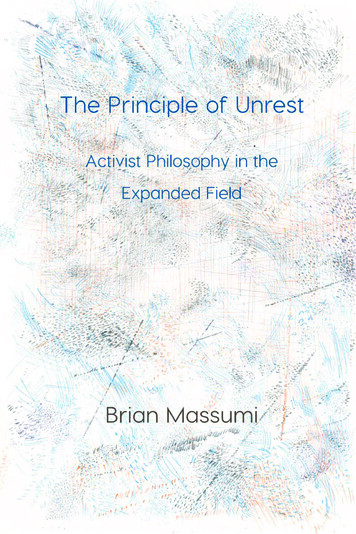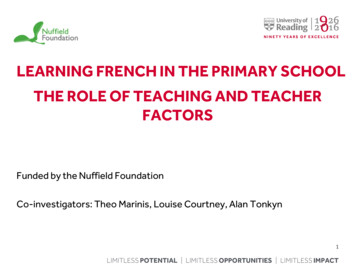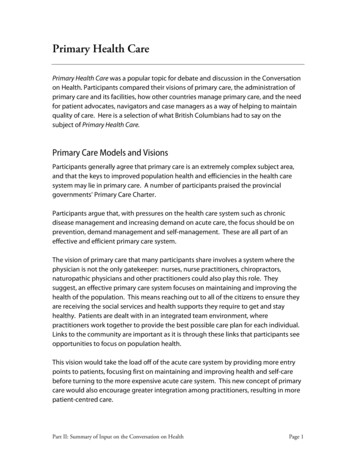
Transcription
Güliz AkkaymakNeoliberal Ideology in Primary School Social StudiesTextbooks in Turkey*Güliz Akkaymak, University of Western Ontario, London, CanadaAbstractThis study examines the extent to which fourth and fifthgrade primary school Social Studies textbooks published bythe Ministry of National Education in Turkey between 1980and 2009 represent neoliberal ideology. In an examinationof changes following the restructuring of Turkish primaryschool education in 2004, this analysis compares pre- andpost-reform textbooks according to the ways in which theycommunicate neoliberal discourse. Quantitative andqualitative content analyses of the textbooks show that therepresentation of neoliberal ideology in Social Studiestextbooks has significantly increased since theimplementation of the Turkish Primary School EducationReform of 2004. This paper argues that the content of thenew textbooks has the potential to encourage students tothink within the framework of neoliberalism.Keywords: neoliberalism, educational reform, social studies,textbooks, TurkeyIntroductionA global shift in educational systems, geared to make content morecompatible with the requirements and/or interests of the neoliberalmarket economy, has come to the fore over the course of the lastdecade. Developments in communication, coupled with rapid exchangeof information made possible through technology, have transformed theskills individuals must now possess. Transference from an industrial to aknowledge-based economy further increases the sensitivity of*Akkaymak, G. (forthcoming). Neoliberal Ideology in Primary School Social Studies Textbooks in Turkey.Journal for Critical Education Policy Studies.282 P a g e
Neoliberal Ideology in Primary School Social Studies Textbooks in Turkeyeducational systems to economic changes, necessitating theirreorganisation with respect to the demands of contemporary worldeconomy (Carney, 2008; Gültekin, 2007; Olssen and Peters, 2005).Several countries, such as Sweden, Norway (Aasen, 2003), China(Carney, 2008), and Uganda (Altinyelken, 2010), have broughteducation and economy together through educational reforms thataddress the needs of the market economy. It is my intention, in thispaper, to contribute to the literature on neoliberalism and its impact oneducational discourse, with a specific focus on curriculum reform inTurkey.Discourse on market-driven educational reforms concentrates on “arhetoric of curriculum change and modernization” (Bonal, 2003, p.170),which indicates that privatization is not the sole mechanism ofneoliberalism-directed change in educational systems. Educationalreforms made in the neoliberal era have focused on management,administrative systems, and the educational process itself (Karsten,1999). Therefore, a critical exploration of neoliberalism must address the“transformation of its discursive deployment, as a new understanding ofhuman nature and social existence” (Read, 2009, p.26). This paperexplores how discourse on education in Turkey has changed since1980, and how this corresponds to the implementation of neoliberalpolicies in the country. For this purpose, I have examined a) the extentto which neoliberal ideology has been represented in the fourth and fifthgrade primary school Social Studies textbooks published by the Ministryof National Education (MoNE) between 1980 and 2009, and b) whetheror not the content of the textbooks has the potential to lead students tothink within the framework of neoliberalism.Although Turkey has practiced neoliberal policies since the 1980s, thefirst structural educational reform of the neoliberal era was initiated in2004, when the Primary School Education Reform reorganised theexisting primary school curriculum and textbooks. Amendments to thecontent of primary school education made by this reform have beenseverely criticized. Critics of the reform argue that the content ofeducation was reorganised in accordance with market demands, andthat consequently, neoliberal discourse has become dominant with283 P a g e
Güliz Akkaymakregard to both curriculum and textbooks (Adıgüzel, 2010; Yıldız, 2008).For instance, in their study of the 2004 reform in Turkey, İnal, Akkaymakand Yıldırım (2014) identified changes made in the curriculum andargued that the reform has integrated the neoliberal discourse in thecurriculum. However, there exists no study that empirically investigatesthe relationship between economic policies and textbook content. In thispaper, I build on and extend İnal, Akkaymak and Yıldırım’s (2014) studyby comparing the content of pre- and post-reform textbooks representingneoliberal discourse. Furthermore, so much of the literature on therestructuring of educational systems in the neoliberal era focuses onhigher education (e.g. Giroux, 2002; Levidow, 2005;, Olssen and Peters,2005), but largely neglects primary school education. The overall goal ofthis paper is to broaden our knowledge on the impact of neoliberalpolicies on primary school education, and to provide alternatives to theneoliberal understanding of education. The first section provides ageneral overview of the relationship between neoliberal ideology andeducational systems; the second focuses on the reform process inTurkey; the third presents the methodology of the present study; and thefourth discusses the findings of the study.Neoliberal ideology in the educational agendaThe philosophy of neoliberalism is rooted in market rationality and theactive encouragement of laissez-faire economic systems worldwide(Mitchell, 2004). Though scholars do not always agree on a conclusivedefinition of neoliberalism, it can generally be defined as a theory ofpolitical and economic practices that favour the liberation of individualentrepreneurial freedoms and skills, all within an institutional frameworkcharacterized by strong private property rights, free markets and freetrade (Harvey, 2005). Even though neoliberalism as a political economictheory proposes a minimal role for the state, in reality, states stillmaintain a noteworthy role in relation to work, welfare, education anddefence (Olssen, 2004, p.240). They also have a growing responsibilityto ensure the reproduction of the economic system (Bonal, 2003), andthis, in turn, necessitates a perpetual effort to actively shape the kinds ofindividuals who will eventually comply with that system (Olssen, Codd,and O’Neill, 2004). Education, as one of the most important ideologicaltools of the state (Althusser, 1971), is used by neoliberal governments to284 P a g e
Neoliberal Ideology in Primary School Social Studies Textbooks in Turkeypromote the internalisation of state policies. In other words, education isalways political (Apple, 2001; Giroux, 2008; Gök, 1999; Olssen andPeters, 2005), and the state serves the continuity of the economicsystem by making various amendments in the educational system,including its content (Hursh, 2005). In line with neoliberalism’s ambitionto create a culture of individualistic and market-oriented behaviour inpeople of all social classes (Soedeberg, Menz and Cerny, 2005, pp.12–13), the goal of education in the neoliberal era becomes promotingknowledge that contributes to economic productivity and producingstudents who are compliant, productive (Hursh, 2000) and capable ofresponding to the demands of the economic system (Gökçe, 2000). Thefocus of education, in this respect, has shifted from intellectual and moralquestions to effectiveness and efficiency (Olssen, et al., 2004, p.191).To better understand amendments to the educational system in theneoliberal era, we also need to look at the role of forces other than thestates themselves. International aid agencies, non-governmentalorganisations (NGOs) and corporations all impact the way education isorganised (Apple, 2001). Neoliberal governments and these socialforces work together to reorganize educational systems according to themarket economy. Indeed, reform initiatives in various countries verify therole of multiple forces in the transformation of educational systems. Forinstance, Carney (2008) analysed educational reform attempts in thePeople’s Republic of China, and found that international policyorganisations (e.g. the OECD) and multilateral development agencies(e.g. the World Bank) impacted the educational reform process in China.To prepare China for the global knowledge economy, educationalreforms were developed in accordance with the demands of the marketeconomy. Significantly, the 2004 educational reform in Turkey showedsimilarities to reforms implemented in other countries (e.g. Norway,Sweden, and China), both in terms of the participation of various forcesin the reform process and the focus on economic necessities.Educational reform in Turkey’s agendaPreviously, the last time the MoNE had reorganised the primary schoolcurriculum was in 1968. Instead of making a comprehensive285 P a g e
Güliz Akkaymakamendment, previous governments made only minor changes in thecontent of education system. As a result, Turkey practiced the samecurriculum between 1968 and 2004. The necessity of a comprehensiveeducational reform was first underlined by the Justice and DevelopmentParty (JDP) in 2003. The Party began working on the primary schoolcurriculum in early 2003, and the new educational reform was finalized in2004.The 2004 Primary School Education Reform changed the structure ofthe Turkish educational system from a behaviourist educational model toa constructivist (student-centred1) educational model. The behaviouristeducation model is a teacher-centred model with an inflexible curriculumthat prevents teachers from making any revisions. This educationalprocess is based upon one-way transmission of knowledge fromteachers to students. Consequently, it envisages passive students andauthoritative teachers. An emphasis upon knowledge directs students torote learning without allowing them to question the material (Altinyelken,2010).Conversely, the constructivist model values the individual, and does notfavour rote learning. It highlights the importance of individual identity ineducation, and places learners at the centre of the teaching process(Carney, 2008). Teachers and students construct knowledge by applyingproblem-solving methods to contexts without fixed solutions (Popkewitz,2000). In the constructivist educational model, the teacher maintainsimplicit control over students, and students are expected to rearrangeand explore the learning context put in place by the teacher. This givesthem a chance to control how they select and structure knowledge,which is indicative of the democratic nature of this model (Hartley, 2009,p.427). However, as Carney (2008) asserts, the aim of policymakers is“to create teaching and learning conditions conducive to the nurturing ofcreative, flexible and cooperative citizens and workers” (p.41) throughthe constructivist educational model. Even though it gives students anactive role in the learning process, the constructivist model neverthelessrestricts them within the framework of neoliberalism (İnal, 2008). Sincethe purpose of this article is not to discuss whether or not the model ispedagogically successful (see Altinyelken, 2011), it focuses instead on286 P a g e
Neoliberal Ideology in Primary School Social Studies Textbooks in Turkeythe content of textbooks within the context of a constructivist educationalmodel.Following the 2004 reform, the curricula of the primary school Türkçe(Turkish) (grades 1-5), Hayat Bilgisi (Life Knowledge) (grades 1-3), Fenve Teknoloji (Science and Technology) (grades 4-5) and Sosyal Bilgiler(Social Studies) (grades 4-5) were rearranged by the Board of Trainingand Education, the main body of the MoNE that prepares curricula andtextbooks in accordance with the constructivist model. During the 20042005 academic year, a pilot study of new curricula was conducted innine cities (Ankara, Bolu, Diyarbakır, Hatay, Istanbul, Izmir, Kocaeli,Samsun, and Van) and in 120 primary schools (MoNE, 2005a, p.47).The new model was then implemented nationwide during the 2005-2006academic year.Why a new reform?Why did the JDP government initiate the 2004 Primary School EducationReform? To answer this question, I examined the JDP’s partyprogrammes and government programmes, written ministry documentsabout the reform, and critical literature on the topic.The JDP, the single ruling party in Turkey since 2002, has underlinedthe necessity of a fundamental educational reform in a number of partydocuments. In its party programmes, for instance, the JDP labels thenational educational system of Turkey as insufficient to fully respond tothe requirements of the contemporary world. Specifically, they argue thatTurkey’s educational system is incompatible with technologicaldevelopments, and thereby unable to develop the human capitalnecessary for today’s world (see JDP, 2001). Party programmes furtherstate that “according to our party, education is the main element ofdevelopment that leads development in all other spheres. Therefore,societies which cannot use their human capital efficiently are consignedto lose their competitive edge” (JDP, 2001, n.p.). The party asserts thatthe “curriculum of contemporary education will be reorganised inaccordance with the requirements of the century, with our necessitiesand with the skills that students will acquire” (JDP, 2002, n.p.). Emphasison human capital development and global competition, however, is287 P a g e
Güliz Akkaymakunsurprising, as “global capitalism has placed education at the forefrontof national competitiveness” (McGregor, 2009, p.345). Similar togovernments in many other countries, the JDP responded witheducational reform that was designed to address the needs of the globalcapitalist economy.Although Turkey’s economic system embraced neoliberalism decadesago, the educational system only turned to neoliberalism in 2004.Consequently, I argue that its existence as a single-party governmentmade it easier for the JDP to enact fundamental changes in theeducational system.2 The JDP states in its Emergency Action Plan,declared on 16 November 2002, and in other government programmes,that being a single-party government gives them the ability to producesolutions to previously unsolved problems in a short period of time.In a report entitled Changing Years in Education 2003-2004, the MoNEexplains the reasons for and targets of the 2004 reform:Course programmes were not in line with presentconditions, and that was one of the most problematicaspects of the national education system. Turkey hadneglected all changes made in the educational sphere thusfar. The curriculum was renewed 40 years ago studentswill not be like a computer disk anymore, after the newcurriculum. They will be educated to produce, question,think, follow scientific developments, and respond to theneeds of social life (MoNE, 2005b, p.59).Likewise, in the Education Bulletin, the Ministry elucidates itsreasoning:There are changes and improvements in individual, socialand economic spheres of life throughout the world. Thesechanges and improvements are also seen in demographicstructure, scientific understanding, science technology,professional relations and labour force quality, localisationand globalisation processes of Turkey. It becomes288 P a g e
Neoliberal Ideology in Primary School Social Studies Textbooks in Turkeynecessary to reflect all these changes and improvementsinto our educational system and programmes (MoNE,2005a, n.p.).The quotes above demonstrate that the Ministry considered theeducational system obsolete, which in turn necessitated rearranging it inaccordance with current economic conditions. Furthermore, the lowsuccess rate of Turkish students in international tests such as the PISA3,PIRLS4 and TIMSS5 called the behaviourist educational model intoquestion (Akpınar and Aydın, 2007; Gültekin, 2007; TUSIAD, 2006). Toillustrate, Turkey ranked twenty-eighth among thirty-five countries thattook part in PIRLS in 2001 (Gültekin, 2007, p.486). While preparing forthe 2004 reform, the Ministry was inspired by educational reforms incountries that achieved high scores on international tests and alsoutilized a constructivist educational model, just as Australia, England,Ireland, and Spain did (Akpınar and Aydın, 2007, p.84). The Ministrywanted a new curriculum to provide students with the opportunity todiscover their own individual skills, develop analytical and criticalthinking, and improve their problem-solving skills (TUSIAD, 2006, p.83).These changes correspond with the global tendency towards personaland emotional development, creative development, and lifelong learningin primary school education (Gültekin, 2007, p.485).Additionally, various entities, particularly the European Union (EU) andthe Turkish Industrialists’ and Businessmen’s Association (TUSIAD),have also stressed the necessity of reforming the Turkish educationalsystem. In its annual progress reports in the early 2000s, the EUunderlined the deficits of the Turkish educational system and listedseveral recommendations, including revising curriculum and teachingtechniques (EU, 2002) and establishing a better connection betweeneducation and the job market (EU, 2004); and adapting educationalsystems to an increasingly knowledge- and competition-based economy.Similar to the EU, since the early 1990s, the business world in Turkeyhas been emphasizing the necessity of reforming the educationalsystem. TUSIAD, which was founded by Turkey’s biggest capitalists in1971, has elucidated the importance of education for economicdevelopment in its various reports and called the state to reform the289 P a g e
Güliz Akkaymakeducational system in accordance with a competition-based market toachieve sustainable growth and development in Turkey (TUSIAD 1990;2006). Although neither the EU nor TUSIAD had a leading role in the2004 reform process, both their emphasis on the necessity ofimplementing a new education model and their reports demonstrate theirbelief in the importance of adapting education to the market economy,and laid the groundwork for the reform, to which the JDP responded inits 2004 reform.The present studyTo determine the extent to which fourth and fifth grade Social Studiestextbooks published since 1980 represent neoliberal ideology, Iconducted quantitative and qualitative content analyses of the textbooksin 2010. I determined keywords and four main categories based uponthe literature. The keywords were enumerated in the quantitative contentanalysis section, and the contexts in which these words are used wereanalysed in the qualitative analysis section. They are as follows: C/I-Enterprise: entrepreneurship, marketing, investment,advertisement, competition C/II-Consumption: consumer, consumption, shopping, purchasing C/III-Individual: individual success, career, vision, mission,leadership C/IV-Economic Activities: import, export, commerce, internalcommerce, external commerce, privatization, producing,production.Quantitative content analysisKeywords were counted for frequency rather than presence. Thenumber of times each word appears is assumed to be an indicator of itsimportance. After the enumeration, I created a table to illustrate the totalnumber of times that each textbook used each word. In order todetermine the significance of keyword inclusion differences between thepre- and post-reform textbooks, I conducted an independent sample ttest.Qualitative content analysis290 P a g e
Neoliberal Ideology in Primary School Social Studies Textbooks in TurkeyThe contextual use of the keywords is analysed via qualitative contentanalysis, which includes both manifest and latent content analyses.While the former centres upon what the text explicitly states, the latter isconcerned with what the text implicitly addresses (Krippendorff, 2004).Population of the content analysisThe fourth and fifth grade primary school Social Studies textbookspublished by the Ministry of National Education since 1980 constitute thesubject of this study. Since 1980, the MoNE has published 60 socialstudies textbooks: 30 for the fourth grade and 30 for the fifth grade.Since the reform, it has published 5 workbooks.6 Even though theMinistry publishes textbooks annually, their content does not changeevery year. Years that correspond with changes to textbook content are1980, 1990, 1998 and 2005. Therefore, the content analysis of thefourth-grade textbooks covers the years 1980, 1990, 2000 and 2006,and content analysis of the fifth grade covers 1980, 1990, 1999 and2006. However, due to the absence of 1998 and 2005 textbooks in theMinistry of National Education’s archive library, the analyses were madewith 1999, 2000 and 2006 textbooks. All in all, ten textbooks wereanalysed in this study.7 All textbooks were published in Turkish; thus,content analysis was first performed in Turkish. Later, I translated theidentified key words and quoted passages into English.Findings and discussionQuantitative content analysisQuantitative content analysis showed that the keywords were used morethan twice as often in the post-reform textbooks in comparison with prereform textbooks (Table 1). In order to determine if this difference issignificant, an independent sample t-test was conducted. The keywordsused in the 1980, 1990, and 1999/2000 textbooks were averaged toform an overall composite labelled as pre-reform textbooks. Theanalyses revealed that there was a significant difference between prereform (M 7.19, SD 13.92) and post-reform textbooks (M 19.36,SD 29.88), (t (42) -1.73, p .09). The difference between thetextbooks was marginally significant, given the low sample size.291 P a g e
Güliz AkkaymakHowever, the analysis indicated that the keywords were used morefrequently in the post-reform than the pre-reform textbooks.Table 1. Sum total of keywords in each icActivities000812619579239Total155217103426This result illustrates the fact that students educated with the newtextbooks are exposed to more neoliberal discourse than studentseducated in the pre-2004 reform era. Based upon this finding, I arguethat the post-reform textbooks familiarize students with neoliberalconcepts, and therefore have the potential to direct them to think withinthe framework of neoliberalism.Qualitative Content AnalysisThe post-reform textbooks differ from the pre-reform textbooks withregard to their portrayal of the individual. The pre-reform textbooksdefine the individual as a member of family and society. There is astrong emphasis on the significance of living both in and for society andcountry. Less emphasis is found in the new textbooks about being amember of a family or of society. The focus shifts perceptibly from asociety-based description to an individually-based description. Forexample, the pre-reform textbooks contain the sections Ailenin önemi(The Importance of Family), Toplum içinde yaşamanın önemi (TheImportance of Living in Society), and Toplum hayatında işbirliği vedayanışmanın önemi (The Importance of Collaboration and Solidarity inCommunity Life). The pre-reform textbooks suggest that the well-beingof society takes priority over that of the individual and, consequently, thatthe individual should work for the benefit of society. In contrast, post292 P a g e
Neoliberal Ideology in Primary School Social Studies Textbooks in Turkeyreform textbooks state that society appreciates successful individuals.There is no emphasis upon being a member of society, nor do postreform textbooks include the idea that the individual lives for the benefitof their society; rather, they emphasize the concept of the self-fulfillingindividual. This comparison demonstrates a shift from collectiveresponsibility to neoliberal values (White and Wyn, 2008 in McGregor,2009, p.347), supporting the argument that people of the neoliberal eraare more prone to be competitive, self-interested individuals competingfor their own material gain (Giroux, 2008, p.113).The diminished emphasis on family in post-reform textbooks may appearcontradictory with neoconservative character of the JDP government, yetI suggest that the JDP has developed ways of dealing with suchcontradiction. The idea of family and its importance, for example, isaddressed by post-reform textbooks only to the extent which theemphasis would not overshadow the individualisation aspect ofneoliberalism. As Apple (2006) reminds us, those governments who areboth neoliberal and conservative aim to alter people’s understanding ofcollectivism, and to replace the idea of membership of collective groupwith the idea of individualism which encourages everyone to maximizetheir own interests. The post-reform textbooks’ diminished emphasis onfamily and also society, in this context, does not challenge theneoconservative side of the JDP, and shows similarities with policiesimplemented in other countries (see Hiroko, 2008; Larner, 2000).Furthermore, as a way to serve both neoliberal and neoconservativeideology, the Party introduced the principles of neoliberalism into theeducation system with the 2004 reform and the principles ofneoconservatism were integrated with the inclusion of a number ofelective religious courses in 2012 (for a discussion on this amendment,see Güven, 2012).The post-reform textbooks also differ in terms of their emphasis on theparticipation of businesses in public service. A section in the fifth gradetextbook entitled Onlar birer hayırsever (They Are All Philanthropists)discusses the participation of the business sector in public service,stating that “well-known businessmen and companies of our countrycarry out social projects through their charitable foundations. They work293 P a g e
Güliz Akkaymakfor the public by being active in different social spheres, such aseducation, health, art and sport” (Karagöz et al., 2006a, p.150). Theappearance of the business community’s participation in the publicsphere in post-reform textbooks has several crucial implications. First,public services like education and health are presented as if thebusiness world has responsibility for them. Second, this participationimplies the privatisation of public services. Although the push to privatisepublic services has intensified since the 1990s, Turkey has experiencedthe major privatisation boom in the 2000s (i.e., during the JDP era)(Öniş, 2011). For this reason, it is not surprising that participation of thebusiness world in public services was introduced as a topic of study withthe 2004 reform. Third, the emphasis on “charitable foundations”disguises the functioning of the market economy and creates an illusionof understanding of the issue of privatisation. The keyword “charity”conceals the dependency of public services on the business community.Following privatisation and the decreasing role of the state, the share ofthe business community in major public services, such as healthcareand education, has intensified. The passages in the post-reformtextbooks, in this context, normalize the involvement of the businesssector in the delivery of these services, and familiarize students with therationality of privatisation.Another difference between the pre- and post-reform textbooks lies inthe concept of citizenship. All of the textbooks published before thereform include a section defining the responsibilities of the state andcitizens. Regulating social life, protecting the country’s security, andincreasing the wealth of society are among the responsibilities of thestate. In return, citizens are responsible for complying with laws andregulations, participating in elections, and paying taxes. Unlike the prereform textbooks, the post-reform ones do not mention the state’sresponsibilities to its citizens. On the contrary, certain passages indicatethat the responsibilities of citizens have been broadened. The pre-reformtextbooks say that students are responsible for keeping their schoolsand neighbourhoods clean and tidy. In the post-reform textbooks,students have different responsibilities; for instance, they areencouraged to contribute to their schools’ budgets. The fourth gradetextbook includes the section Toplum hayatında dayanışma (Solidarity in294 P a g e
Neoliberal Ideology in Primary School Social Studies Textbooks in TurkeySocial Life), and the sub-section Kermes (Fair). This passage narratesthe story of Zeynep and Kemal, two students who have experiencedproblems during the academic year due to deficiencies in their primaryschool. In order to avoid similar problems in the future, they decide tocollect donations for their school by organising a fair. The passagestates “In Kermes, students sold products they had made in theclassroom during the year, along with items donated by neighbourhoodshopkeepers. By the end of Kermes, they had earned a great amount ofmoney, which was used for their school’s renovation” (Tekerek et al.,2006, p.135).This example illustrates that students are expected to adoptresponsibility for the renovation of their school. It normalizes a situationin which students can and should provide the funding necessary for itsreconstruction. An absence of these kinds of examples in pre-reformtextbooks signals a change in the state’s expectations of its citizens.Existing studies in the literature have underlined that one of the majoroutcome of neoliberal policies is the individualisation of responsibility(e.g., Čeplak, 2012; Cheshire and Lawrence, 2005; Hiroko, 2008;Luxton, 2010), which refers to “the process of transferring responsibilityfor social and personal welfare from the state to individuals” (Čeplak,2012, p.1098). I argue that the passage, Kermes, is an example of thisprocess, as it addresses that the state no longer assumes soleresponsibility for the welfare of its schools; instead, it aims to shape aparticular type of individual who feel
to which neoliberal ideology has been represented in the fourth and fifth grade primary school Social Studies textbooks published by the Ministry of National Education (MoNE) between 1980 and 2009, and b) whether or not the content of the textbooks has the potential to lead
